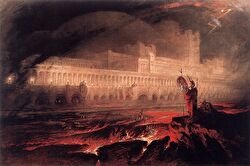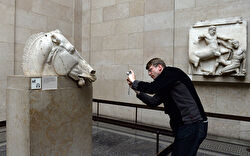
RTE, the Irish state broadcaster, revealed this week that Dublin’s Department of Foreign Affairs and Trade has uncovered “chaos and confusion” in the British government. Well, as they say in diplomatic circles, “quelle surprise!”
Someone in the department had set out to discover what the rest of Europe thought of the British government’s handling of Brexit. The Czech deputy minister for foreign affairs apparently told the Irish he felt “sorry for British ambassadors trying to communicate a coherent message when there is political confusion at home”. The British judge in the European Court of Justice isolated the cause of their misfortune when he moaned about “the quality of politicians in Westminster”.
This at least proves that the tabloid newspapers are wrong when they claim the judiciary is out of touch with public opinion.
For, even if we accept that the Battle of the Boyne still casts a long shadow over anything said by the Irish government about “the Brits”, they are surely right.
This is not about the political complexion of government. Britain currently finds itself saddled with a particularly useless bunch of politicians of all persuasions.
People have always gone into politics for multiple reasons — public service, social change, to promote an ideology or to free the nation of one. Yet, whatever the motivation, all have sought to lead.
Of course, the parliamentary benches have had their share of tweedy Knights of the Shires and sozzled trade unionists who could be relied upon to troop through the lobbies as the whips instructed. But the figures of moral and political stature in the House of Commons were leaders first and last.
Apart from a few individuals who seem to think that public life is a form of music hall, the upper echelons of public life in Britain are now occupied by dullards.
Sixty-one-year-old Theresa May’s claim to a special place in history for calling an unnecessary election and losing her majority is assured.
The Labour party is led by a 68-year-old man whose main claim to eminence is as five-time winner of the award for Parliamentary Beard of the Year. And the Liberal Democrats’ chief is 74-year-old Vince Cable, who, everyone agrees, is A Very Nice Man.
Though the combined age of the three main party leaders is 203, we cannot hold that against them: Winston Churchill did not become prime minister until he was 65. No, the complaint against the current crop of political leaders is that they are walking contradictions. They may be political. But they are not leaders. In fact, leadership seems to have vanished almost everywhere. Why?
Leadership involves the expression of conviction through action. It requires an ability to inspire others, unlike much of the current parliamentary crop.
To be fair to Jeremy Corbyn, at the last election he does seem to have persuaded previously disillusioned young people into politics. But his vote was not enough to see him sent to Downing Street and we are back to the grimy reality of day-to-day political life, awash with half-truths, name-calling and bluster.
There was a time when even the most second-rate of fee-paying schools proclaimed a belief in “public service”. They are now more interested in providing the few who can afford their eye-watering fees the chance of a leg-up in their children’s exams.
Great numbers of the grammar schools that provided the nation’s eminent intellectuals have gone the same route.
Pupils leave school seeing vacuous celebrity hailed above anything as dull as a life of service to others. Appear on The Only Way is Essex and the world will beat down your door to hear how you think we should deal with Islamist terrorism.
The 650 men and women in parliament — surely, twice as many as we need — must turn out to their local “surgeries”, listen to the sad experiences of their constituents, then return to Westminster to be herded through the division lobbies. The few who defy the whips (such as the anti-EU Conservative right) are dismissed as obsessives, nutters and worse.
The party whips can get away with their bullying, because there is no one outside parliament to provide any alternative way of seeing things. Where are the public intellectuals?
Those of us who have never stood for public office cannot properly appreciate the feeling when a returning officer announces our victory on election night. It must be tremendously exhilarating: everyone seeks significance, and to bask in the endorsement of thousands is to have a very public declaration of love.
But without a demonstrable talent for leadership, it seems to reduce public office to mere narcissism.
The writer is an FT contributing editor



